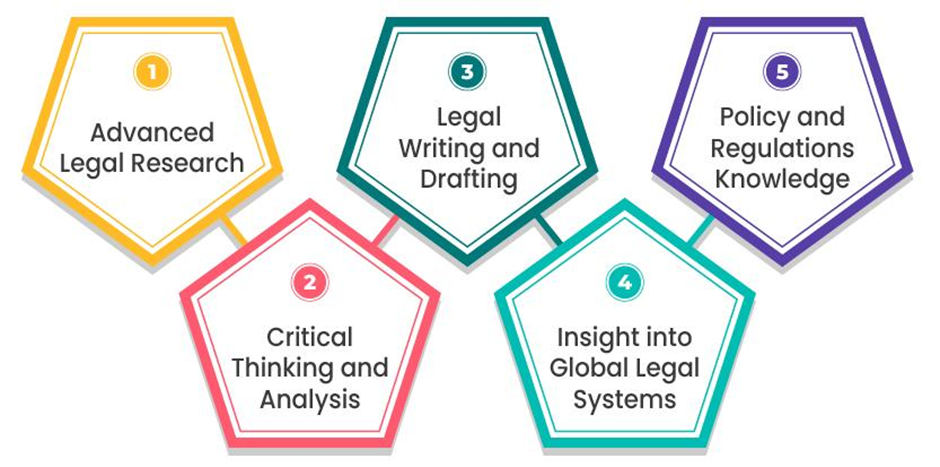LLM in 2025: Benefits, Career Opportunities, and What’s in It for You
The LLM Course is an excellent choice for a law graduate or law practitioner seeking to develop their career in law. It provides high-level legal expertise and allows you to specialise in law such as international law, corporate law or human rights. Moreover, an online LLM course can enable you to study from anywhere and at whatever pace you want.There are several high-ranking universities that offer LLM programs, which are increasingly flexible and more affordable. You are provided with qualified faculty, recorded lectures and online learning content with the LLM online course. This LLM course can enhance your profile, whether you are working or wish to undertake a higher course.
It also opens up opportunities in workplaces, including law firms, government, and international organisations. This blog will tell you all the course details, specialisations, career options and many more for students pursuing LLM to help you in making the right choice.
What does LLM mean?

LLM (Master of Laws) is a postgraduate degree in law for students who have already completed an LLB or other relevant legal studies. The LLM program assists you in having an enhanced understanding of specific fields of legal research, such as international law, corporate law, or constitutional law.
It also helps improve your legal writing, research, and analysis skills. The Master's in Law degree is well-known and can increase your chances of working in top law firms, universities, governmental agencies, or international organisations.
Your LLM degree enhances your career by providing you with in-depth knowledge of a specific legal area. A Master’s in Law (LLM) is a good option for anyone to upskill in the legal field, regardless of whether it is full-time, part-time, or entirely online.
Why choose an LLM course?
The LLM course assists you in specialising in a field of law and offers you advanced knowledge of the law. It is most suitable for anyone who wishes to pursue a career and work in an academic or research role within international organisations. An LLM program enhances your legal knowledge on complex questions and develops your analytical and research capabilities.The master’s program in Law offers more employment opportunities in legal firms, company law, non-governmental organisations, and government institutions. An LLM will enhance the value of your profile if you wish to work in foreign countries or an international legal environment.
The online LLM programs give working professionals the flexibility to study without taking a break in their careers. It is to acquire knowledge or promotion to senior roles. An LLM course would enable you to lead in the highly competitive legal world.
Who should pursue an LLM?
An LLM is ideal for individuals who wish to advance their legal knowledge and specialise in the law. Though you might already work, most programs allow an online LLM course, so you can study and have a job at the same time. It is most appropriate to:- Graduates wanting to acquire expert knowledge in the law.
- Practising lawyers who are actively practising and want to expand or move to a different field of law.
- Legal practitioners aiming to upskill and practice in a corporate, governmental or NGO institution.
- Researchers and academicians who need a job in teaching or law research.
- Professionals who wish to practice in other countries where an LLM is desirable or mandatory.
Top Specialisations Provided in the LLM Programs
The LLM programs enable you to specialise in a given field of law that you are interested in, following your career goals. Choosing the right LLM specialisation can shape your future in the legal field. Some of the common specialisations include:
International Business Law
The international business law specialisation focuses on global trade, transactions, and regulations governing international trade. It is ideal for individuals who wish to practice in multinational companies, international law firms, or trade associations. Students study international contracts, dispute resolution, and regulatory compliance.Intellectual Property Rights (IPR)
A specialisation in IPR addresses the issue of protecting such creations as inventions, trademarks, copyrights, and designs. It is particularly suitable for individuals in the tech, media, or creative fields. The course develops competence in legal protection, patent filing, and management of intellectual assets.Human Rights Law
This HR Law specialisation focuses on protecting basic human freedoms and dignity through the legal system. It equips students to work with non-governmental organisations, as well as governmental and international organisations. These include refugee law, gender justice and constitutional rights.Cyber Law
An LLM in Cyber Law deals with internet regulation, digital security, and cyber law. This degree may be beneficial for individuals interested in data protection, cybersecurity, or technology law. You'll study topics related to cyber law, such as online fraud, privacy law, and IT regulations.Criminal Law
An LLM in Criminal Law will discuss criminal laws, criminal procedures, and justice processes. This would be an appropriate LLM degree program for individuals seeking to become attorneys, litigators, or criminal investigators. You will learn about concepts such as evidence, punishment, and the rights of the accused.Eligibility Criteria for LLM Course
Who can apply?
Individuals aiming to pursue an LLM must meet certain academic and educational standards. These may differ slightly depending on the institution.Key Eligibility Criteria:
- A Bachelor of Laws (LLB) or other law qualification.
- A recognised university or institution must offer the last law qualification.
- Candidates are required to have scored at least 50% to 55% marks in their LLB (this may differ based on category or university).
- Some universities may require an entrance exam or working experience in the legal profession (especially for specialised or online courses).
Duration and Modes of LLM Course
The duration of an LLM course depends on its mode of study. Some LLM courses are part-time, while others are full-time or online.- Full-time LLM: 1 to 2 years, especially ideal for recent graduates who can dedicate their time to studying full-time.
- Part-time LLM: Generally 2-3 years, and is designed for working professional who can balance their career with legal studies.
- Online LLM: Usually 12-24 months, and more self-paced, allowing for flexibility. This is ideal for individuals who wish to study remotely at their own pace.
Skills You Can Gain from LLM
A postgraduate degree in Law not only enhances your legal knowledge and research skills but also provides the essential practical and professional skills in legal practice. Some of the important skills you will develop include:
- Advanced Legal Research: An LLM course allows you to learn to conduct deeper legal research using national and international legal sources and databases.
- Critical Thinking and Analysis: With a master's degree in law, you can develop your ability to analyse complex legal issues and interpret laws logically and critically.
- Legal Writing and Drafting: The curriculum of the LLM program assists you in mastering the technique of writing legal documents, contracts, case briefs and research reports accurately.
- Insight into Global Legal Systems: Engaging in an LLM (Master of Laws) allows you to gain insight into international laws, treaties, and cross-border areas of legal practice.
- Policy and Regulations Knowledge: A master’s course curriculum in law assists you in understanding legal frameworks, compliance standards, and the implications they have on business and society.
Career Opportunities and Average Salary After an LLM
An LLM degree opens doors to diverse roles in law firms, corporations, academic institutions, and global organisations. The LLM career opportunities include some of the following:| Job Role | Responsibilities | Annual Average Salary |
|---|---|---|
| Legal Advisor | As a legal consultant, you will provide legal advice to individuals, businesses, or government agencies. | INR 5,00,000-10,00,000 |
| Corporate Lawyer | Corporate counsellors deal with company law, mergers, compliance, and contractual negotiations. | INR 6,00,000-12,00,000 |
| Human Rights Advocate | A human rights lawyer works for non-governmental organisations (NGO) or international organisations to protect and advance rights. | INR 4,00,000-8,00,000 |
| Academician or Legal Researcher | An academic/legal researcher works to teach law or may work on publications in the legal field or policy research. | INR 4,00,000-9,00,000 |
| Compliance Officer | As a compliance officer, you will ensure that organisations meet legal and regulatory requirements. | INR 5,00,000-11,00,000 |
Advantages of Pursuing an LLM
Some of the main advantages of joining an LLM will include the following, whether it is online or on campus:1. Specialised Legal Experience
An LLM will enable you to specialise in a specific legal field like corporate law, human rights or international trade law. This understanding enhances your legal arguments and your ability to stand out in a competitive legal employment market. It also helps you deal with challenging legal cases with greater confidence.
2. Improved Career Prospects
With higher qualifications, you will be able to hold more high positions in law firms, the government or global organisations. Employers regard LLM graduates as those aware of specific subject knowledge and having analytical abilities. It also leads to non-conventional positions such as compliance, policy advising or in-house counselling jobs.
3. Research and scholarly Scope
Most people who have academics or teaching as their career goals find LLMs as a step toward a PhD or an academic position. It trains you in research, writing, and referencing skills, which are essential for securing publications or working with a think tank. Most law schools are willing to employ LLM degree holders.
4. International Reputation and Mobility
The chances of working abroad or in international institutions are higher with an LLM at a reputable university, especially in international law. It means that you can appreciate various legal constitutions and international law. Lawyers who aspire to a global career find this particularly helpful.
5. Individual and Career Development
LLM enables you to engage in legal arguments. It enhances soft skills such as public speaking, research discipline and an independent mind. As you have higher confidence in discussing legal matters, law-making and handling clients, which are key characteristics in any legal profession.
Challenges of Pursuing an LLM and How to Overcome Them?
| Challenge | Description | How to Overcome? |
|---|---|---|
| Time Management | Studying and working, or balancing work and life, can be challenging, particularly in an online environment. | They should establish a daily study plan, use planners, and set small week-to-week objectives. |
| Complex Legal Concepts | International law or IPR are not an easy topic to master without explaining it with adequate care. | Watch video tutorials, make peer study groups and talk to professors. |
| Heavy Reading Workload | LLM involves a lot of case law, articles, and other research papers, and the volume can be high. | Break readings into manageable chunks, summarise notes, and review often. |
| Limited Practical Training | Some LLM programs rely heavily on theory, meaning some programs provide less opportunity for real-world application. | Involve yourselves in internships, moot courts, and legal aid clinics. |
| Academic Pressure | The pressure to consistently perform during assignments, papers, and presentations can be stressful. | Manage your time, seek faculty feedback, and ask for help. |
How to Choose the Right LLM Program?
Choosing the right LLM program is important for your academic and professional success. Below are some essential considerations you need to make before making your choice:
1. Define Your Area of Interest
You should select a law specialisation that aligns with your career aim and interests. For example, you could choose corporate law, criminal law, IPR, international law, etc. Once you have selected an area of specialisation, your professional engagement will be enhanced, and you will have better job opportunities.
2. Examine University Reputation and Accreditation
Ensure that the university is recognised by the UGC (or an equivalent body) and has a good reputation in legal education. Every country has its own ranking system for institutions, but rankings or accreditation can increase the value of your degree.
3. Review the Curriculum and Faculty
Go through the course outline, subjects, and method of delivery, and choose a program with a qualified faculty member who has practical or academic experience in your area of interest.
4. Explore Flexibility and Method of Delivery
If you are working and taking a part-time program or an online LLM, consider how the course will allow you the opportunity for learning according to your schedule. Look for programs that offer live classes, recorded lectures and assessments based on assignments.
5. Check Fee and Financial Aid
Review the fee structure to know what scholarships are available, as well as the EMI and payment arrangements. A good program should offer quality learning at a reasonable price.
6. Look At Alumni and Placement Opportunities
Research the alumni and their careers after completing the LLM, and examine the career services programs offered by the university in terms of career development, internship programs, and networking opportunities.
7. Read Reviews and Speak to Current Students
Connect with current students, search for forums, or watch student testimonials to gain insight into the program's perspective and general learning experience.
Conclusion
If you would like to advance your legal career and enhance your professional skills, getting an LLM is a wise choice. A Master's in Law (LLM) will allow you to gain and learn even deeper knowledge than you would with an LLB. If you are planning to work for a leading law firm or international organisations, or pursuing academic insights, an LLM will help you get to the top of your field more quickly.The skills gained through an LLM, such as legal research, writing, and analytical thinking, are all in-demand skills in the sector. Many universities are also offering flexible and affordable options for studying, and therefore, there is no need to put your career on hold. Choose the best LLM course specialisation that is available and relevant to your professional development needs. If you wish to advance in a competitive legal profession, choosing the LLM should be the next step.
Frequently Asked Questions (FAQs)
1. Who can apply for an LLM course?Anyone with any LLB or equivalent law degree from a recognised university can apply for an LLM (Master's in LAW) program.
2. Is an online LLM valid in India or abroad?
Yes, an online LLM is acceptable and valid, offered by a university that is UGC-approved or globally recognised.
3. How long does it take to finish an LLM?
An LLM usually takes 1-2 years, but this varies widely depending on your degree structure and available flexibility.
4. Can I complete my online LLM whilst working full-time?
Yes. Online LLM programs have usually been designed for flexibility for working professionals or part-time learners to study.
5. What careers can I pursue after an LLM?
An LLM graduate can acquire a role as a lawyer, legal adviser, corporate lawyer, compliance officer, academic, or policy analyst.
Trending Posts
-
DBA in India & Abroad: Top Careers, Salaries & Best Universities
-
Do You Really Need UGC-NET for a Ph.D in 2025? Let’s Break It Down
-
What Comes After B.Com? The Ultimate Guide to Career-Building Courses in 2025
-
Mukherjee Fellowship – Everything You Need to Know
-
Top 10 In-Demand Courses after BBA for a Successful Career in 2025
-
Top PhD Scholarship and Fellowship Opportunities in India 2025
-
High-Paying Government Jobs After B.Com. You Should Know About
-
Sharda University CDOE: Courses, Admission Process, Tuition Fees
-
Trending and High-Impact MBA Project Topics You Should Consider
-
Decoding CGPA: How to Convert It into Percentage Easily
-
Diploma in 1 Year: Top Courses After 12th to Start Your Career
-
How to Convert Million to Crore? A Simple Calculator Guide
-
Everything You Need to Know About O.P. Jindal University Online Programs
-
UGC-Approved Online and Distance Psychology Programs in India: Top Colleges Listed
-
Top Online MBA Entrance Exams Every Banking Aspirant Should Know About






































































